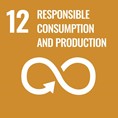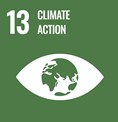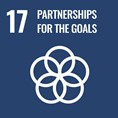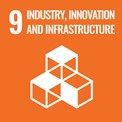Overview
McMaster’s Department of Strategic Procurement works closely with suppliers, students, faculty, and staff to ensure what we buy and how we buy aligns with our sustainability commitments.
Sustainable procurement involves evaluating products and services with the goal of providing the best value and ensuring that products and services purchased are as sustainable as possible, with the lowest environmental impact and most positive social change.
Expandable List
To support the development of sustainable procurement at McMaster, we are striving to meet the following goals by the end of the 2021/2022 academic year.
- Highlight supplier sustainable success stories
- Update and enhance mandatory RFP questions
- Develop an RFP Evaluation Tool to evaluate supplier responses to the RFP questions
- Highlight McMaster sustainable procurement success stories
- Connect sustainable procurement to the UN Sustainable Development Goals
McMaster’s Sustainable Procurement Goals helps advance our commitment to Environmental Social Governance (ESG) and the United Nations Sustainable Development Goals (SDGs).
It is our honour to recognize the work of our student partners in advancing sustainable procurement at McMaster.
Fall 2021: Sustainable Procurement at McMaster
SUSTAIN 3S03 – Implementing Sustainable Change students, Helena Teng, Sara Tamjidi, Aryan Patel, and Joy Xu, worked with four different suppliers to source sustainability success stories Supplier Success Stories, enhanced our RFP template RFP Update to include a set of sustainability questions for which responses are verifiable and comparable, created an RFP Evaluation Tool to help individuals and departments evaluate supplier responses, worked with Media Production Services to highlight the work and future directions for sustainable paper at McMaster, and drew connections between this work and the UN Sustainable Development Goals.
Here is a link to their report
Winter 2022: Drafting McMaster’s First Sustainable Procurement Policy
SUSTAIN 2SS3 – Advocating for Sustainable Change students, Bradley Squarek, Angel Braux, Chan-Chen Liu, Matthew Kastanis, Onai White, and Tenzin Youtso, identified best practices in sustainable procurement in higher education, drafted McMaster’s first sustainable procurement policy, and recommended future actions to advance sustainable procurement at McMaster.
We are committed to continue working with students to advance sustainable procurement at McMaster, and we look forward to sharing more updates in the months to come.
RFP Update
“The greatest contributors to an organization’s footprint usually come from its supply chain.” ~HP Development Company (p.6)
As a part of McMaster’s commitment to the United Nations Sustainable Development Goals, it is important for McMaster to value the sustainability of our suppliers and reward the companies who have a strong commitment to sustainability. This is where the Request for Proposal (RFP) is important. RFPs are required for purchases over $100,000 and include questions for suppliers to answer. Specifically, RFP template focuses on sustainability.
Sourced from HP’s Sustainable IT Purchasing Guide, the following questions were chosen because they were verifiable, measurable, and replicable:
- List your company carbon footprint and goals to reduce it
- List your CDP (carbon, forests, water, and supply chain) and EcoVadis scores
- Provide the total cost of ownership (TCO) for the services/products
- List all Ecolabels applicable to this product
- Identify how this service or product assists you in meeting your sustainability goals
- Identify % of post-consumer, ocean-bound and/or closed loop plastics in the products and your publicly stated recycled content goal
- Describe any paid time you provide your employees to volunteer
To support McMaster faculty, staff, and students in evaluating supplier responses to the above questions, please see McMaster’s RFP Evaluation Tool at https://financial-affairs.mcmaster.ca/sustainable-procurement/#tab-content-rfp-tools. Under RFP Tools, there are more questions that can be included in an RFP, such as a request for a supplier to take back waste or items at the end of life.
RFP Tools
The resources below can be used to build and evaluate Section – 9 of McMaster’s standard RFP template in relation to sustainability.
Information Box Group
RFP Evaluation Tool Download Word File Here
McMaster’s standard RFP template – section 9 includes sustainability questions. This tool includes definitions and what to look for when evaluating supplier responses to these questions.
Optional Questions Download Word File Here
This document contains optional sustainability related questions to ask suppliers.
United Nations Sustainable Development Goals
Below are the specific SDGs that directly relate to our 2022 sustainable procurement goals and actions:
Supplier Success Stories
Aimed to inspire sustainable purchasing and exemplify innovations in sustainability, we have included several success stories submitted by some of McMaster’s sustainable suppliers. If you have a success story, let us know spreqbox@mcmaster.ca!
During your next purchase, remember to ask suppliers about their sustainability commitments and metrics. Need help? Go to https://financial-affairs.mcmaster.ca/sustainable-procurement-guide/ for a simple guide to sustainable procurement at McMaster.

Resource Listing
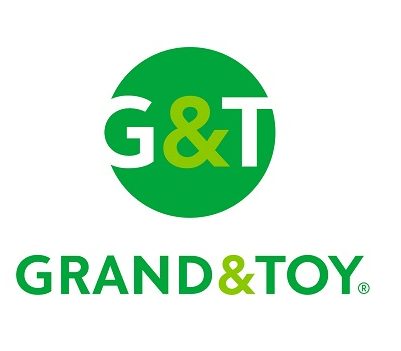
Grand & Toy
Overview: At Grand & Toy, we make a conscious effort to extend sustainability beyond the walls of our operations, through innovative environmental programs, nationwide community investment initiatives, diversity in our people and our supply chain, and other programs implemented throughout our organization that ultimately help build meaningful partnerships with our customers to move the sustainability needle forward.
We place high priority on programs like our patented GreenerOffice™ Rating System, Right Day Delivery Program, Print Releaf and other Recycling Programs for ink/toner, batteries, single-use items, and e-waste to help our customers reduce their eco footprint. Likewise, every year we also encourage, recognize and promote greener buying patterns with our customers through the Greener Purchasing Awards and Earth Day activities to further support the strategic direction of our business. Furthermore, we help our customers easily navigate the impacts of Grand & Toy’s social and environmental performance by communicating our progress in the Corporate Sustainability Report and through industry-recognized disclosure platforms like EcoVadis. Internally, with our commitment to health and wellness, mentoring and disaster relief for the vulnerable, Grand & Toy’s Step Up! program, enables our associates to give back to the community and support charities through robust associate volunteerism.
Together, our sustainability efforts enable prosperity and help drive long-term success. It’s all about doing the right thing – for our shared planet, our valuable communities, and the future of how we service and support our customers.
Closed Loop Recycling at Grand & Toy:
The reduce-reuse-recycle mantra has surely become commonplace in most industries at large. At Grand & Toy, we take this idea further. In our efforts to be good stewards of the planet, we focus on the lifecycle of the products we use in our operations and the ones we provide to our customers – from procurement to disposal.
After use, our recycling programs begin to close the loop as we focus on ways to avoid sending waste to the landfill and offer our customers solutions to reduce or neutralize their carbon footprint.
For example, in our take-back programs for closed-loop recycling, we provide a range of options for recycling everyday office items such as ink & toner cartridges, cellphones, batteries, coffee capsules and technology.
A closer look into our program and services:
TerraCycle Recycling Systems – Grand & Toy became the first Canadian retailer to offer a solution for recycling K-cups in partnership with TerraCycle Canada. We now provide recycling systems nationally for many more items:
- Coffee Capsules
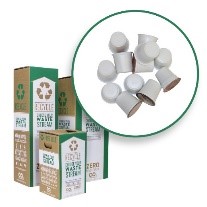
- Pens, Pencils & Markers
- Breakroom Items
- PPE/Safety Equipment
- Computer Accessories
- Mixed Office Supplies
We are especially proud of a gift that we received from our partner (Terracycle) which showcases a tangible result of recycling programs and reinforces our company’s commitment to sustainability.
TerraCycle® Recycling Systems created this beautiful bench specifically for Grand & Toy which is made of recycled plastics from coffee capsules (K-cups) collected through our internal Zero Waste Box Program.
Ink & Toner Recycling Program – ThINK is Grand & Toy’s ink & toner recycling solution for the office. We collect our customer’s empty ink & toner cartridges and ship them to be responsibly remanufactured into new cartridges where possible – while, disassembling and recycling all others that cannot go through the remanufacturing process.
PrintRelief – PrintRelief is a software program that helps Grand & Toy contribute to reforestation projects around the world by tracking everyday printing habits based on paper consumption.
Call2Recycle – Grand & Toy’s partnership to North America’s first and largest battery and cellphone stewardship program, allows our customers to collect and recycle batteries and cell phones at no cost in Canada.
E-waste Recycling – Grand & Toy offers a variety of end-of life management services for electronics and data destruction.
By applying a closed loop recycling mindset, along with our customers, Grand & Toy has helped reduce the amount of energy and natural resources required to make new products. That’s how, Grand & Toy’s Recycling Programs make it easier for customers to be more sustainable.
GreenerOffice™ at Grand & Toy:
Grand & Toy provides customers with the sustainable products and services they need to ‘green’ their business. However, to simplify the process of making green purchasing decisions, our patented GreenerOffice™ Shades of Green Rating System offers customers a consistent and simple method for comparing similar products and choosing progressively greener workplace products.
A closer look into our program and services:
GreenerOffice™ Shades of Green – An innovative eco-rating system classifies green products according to their environmental attributes and 3rd party certified eco-labels, assigning them a Light, Mid or Dark Green shade. The products defined as “green” have one or more of the following broad environmental benefits:
- Reduced Waste
- Reduced Energy Use
- Reduced Chemical Use
GreenerOffice™ Transportation – In a world where every choice has an environmental impact, reducing the number of small and frequent deliveries, drastically improving fuel efficiency, optimizing routes and order packaging/consolidation is a crucial step in our collective environmental responsibility that helps reduce our carbon footprint.
Importance of Disclosures at Grand & Toy – EcoVadis: Here, at Grand & Toy, we strive to support our customers, act with honesty and integrity, and ask question after question to develop innovative workplace solutions with a purpose. We value the recognition we receive, as it shows we are a company driven by associates who are truly making a difference in the world.
EcoVadis awarded Grand & Toy a Silver Recognition Level for achievements in the 62nd percentile of suppliers assessed in corporate social responsibility (CSR) in global supply chains.
Reporting into disclosures like EcoVadis, provides increased visibility and broader insights on Grand & Toy’s corporate social responsibility (CSR) performance and management systems, enabling us and our suppliers to track improvements over time. Our goal is to encourage our internal operations, as well as our suppliers to engage in a long-term change process, advancing and transforming performance in targeted improvement areas.
Upcoming! Grand & Toy (part of the ODP Corporation) is also preparing to submit our commitment and target for validation for Science-based targets (SBTs) in 2022 that are both ambitious and achievable in alignment with our emissions reduction and global climate goals. Likewise, we are exploring our readiness to align with Net-Zero Standards on the SBT platform.

POP-UP
Avantor Sciences
Optimizing Packaging for a more Sustainable Supply Chain / Environmentally Preferable Products (EPP) Program / Waste Diversion & Recycling
Avantor Sciences
Avantor’s sustainability strategy is grounded in the following four pillars aligned with the United Nations Sustainable Development Goals (UN SDGs):
- People & Culture
- Innovation & Environment
- Community Engagement
- Governance & Integrity
Avantor is addressing environmental sustainability of its products and services through several programs including:
OPTIMIZING PACKAGING FOR A MORE SUSTAINABLE SUPPLY CHAIN
Packaging plays a significant role in our own and our customers’ environmental impact. As a result, we continue to utilize a product-to-package ratio optimization within our distribution centers to help our associates in identifying the correct box size for each order. Where possible, we utilize packaging materials that are recyclable and contain postconsumer recycled content. (Avantor Science for Goodness Sustainability Report p.44)
ENVIRONMENTALLY PREFERABLE PRODUCTS (EPP) PROGRAM
Through our Environmentally Preferable Products (EPP) program we can provide greater transparency to our customers, helping them to make more informed and sustainable purchasing decisions. Currently, we offer more than 20,000 different environmentally preferable products for our customers around the globe, indicated on our e-commerce website, VWR.com, as environmentally preferable products. We work with our suppliers to designate sustainable products, materials and equipment based on one or more of these attributes:
- Energy efficient Water efficient
- Waste reducing
- Sustainable materials
- Low manufacturing impact
- Safer human & environmental health
- Sustainable packaging
- Product transparency
By providing this product information and additional transparency with our Environmentally Preferable Products program, our teams can partner with our customers to benchmark sustainable purchasing today and begin to identify more sustainable alternatives to help our customers reduce their operational environmental sustainability impacts and achieve their goals. (Avantor Science for Goodness Sustainability Report p.44)
WASTE DIVERSION & RECYCLING
Through collaboration with our customers, we work to minimize waste generation and divert materials into usable streams rather than landfill. Our comprehensive waste reduction programs provide a complete waste collection, shipment and recycling solution for a variety of used products, including disposable apparel and gloves, pipette tip boxes, safety equipment and protective gear, batteries and more. We collaborate with our customers to find recycling solutions that fit their needs and help them meet their sustainability goals. (Avantor Science for Goodness Sustainability Report p.45)
Learn more about Avantor’s Sustainability Initiatives
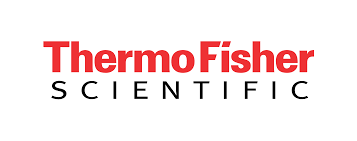
POP-UP
ThermoFisher Scientific
Paper Cooler Shipment / Our Journey to Zero Waste / Get Involved Today
ThermoFisher Scientific
PAPER COOLER SHIPMENT
In 2018, we launched a 100 percent paper cooler for a portion of our cold shipments. For decades, EPS foam coolers have been the preferred external packaging for cold chain shipments, despite being notoriously difficult to recycle. The new, curbside-recyclable, paper cooler meets the thermal requirements necessary to uphold our stringent product quality standards. It’s the next step in our continued pursuit to find better ways to ship our products. In 2019, we expanded the use of our paper coolers to additional distribution centers in the U.S. and Europe impacting 130,000 shipments and eliminating over 84,500 cubic feet of expanded polystyrene.
~ ThermoFischer Scientific 2019 Corporate Social Responsibility Report, p.64)
OUR JOURNEY TO ZERO WASTE
Our Zero Waste program focuses on closely managing our waste streams at the site level, where we work to reduce the amount of waste we generate and send to landfill while lowering our operating costs. We define “zero waste” as diverting 90 percent or more waste from landfill through reuse, recycling and, as a last resort, incineration, when used to generate energy. Through our Zero Waste Playbook, we provide our sites guidance for working toward ”Zero Waste” certification through a five-step process which engages our colleagues to implement changes in processes and procurement to minimize waste. In 2019, our distribution sites in North America performed waste audits to identify opportunities to drive down the amount of waste generated within their operations. Managers at these locations meet quarterly to share best practices and report on their current status, ensuring continued progress.
Number of Zero Waste sites: 26 (Increase of 100% over 2018)
~ (ThermoFischer Scientific 2019 Corporate Social Responsibility Report, p.67)
GET INVOLVED DAY
Our largest annual volunteer effort is “Get Involved Day,” a day of service encouraging colleagues across the globe to give back to their communities with up to 8 hours of volunteerism. Activities are coordinated locally to support charitable causes important to our colleagues, including STEM education events, park and beach clean-ups, food packing events, and working with seniors and children.
Get Involved Day Impact: 170+ events, 3,700+ participating colleagues, and 11,500+ volunteer hours
~(ThermoFischer Scientific 2019 Corporate Social Responsibility Report, p.57)

Dell
Did you know that 8 million tons of plastics end up in our oceans every year and that by 2050, plastics may outnumber fish in the sea?
Dell Technologies has created a new supply chain that recovers ocean-bound plastics, putting them back into our packaging instead of letting them wash out to sea. We work with suppliers to collect, process and mix plastics with other recycled material to create molded trays used for packaging select products. The trays are made from 50% ocean-bound plastic and 50% recycled HDPE plastic, using no virgin materials.
After realizing the seriousness of the problem of ocean plastics, we looked at ways of making a difference. Together with Lonely Whale, we created the Next Wave initiative, an open-source initiative that brings the world’s largest companies together in a combined effort to solve this crisis. Next Wave aims to save over three million pounds of plastic from entering the oceans within the next five years by using it in manufacturing of products and packaging.
Link to Dell reference site:https://corporate.delltechnologies.com/en-us/social-impact/advancing-sustainability/sustainable-products-and-services/materials-use/waste-as-a-resource.htm
MAC Success Stories
Below are some success stories of sustainable purchasing at McMaster. We aim to celebrate sustainable changes implemented at the university in hopes of inspiring others.
If you have a success story, you would like to highlight, please email us at spreqbox@mcmaster.ca
Expandable List
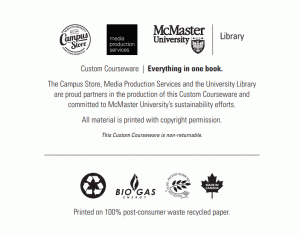 Paper goal: Create a sustainable paper goal and strategy for McMaster, in collaboration with stakeholders across campus
Paper goal: Create a sustainable paper goal and strategy for McMaster, in collaboration with stakeholders across campus
McMaster’s Media Production Services (MPS) is committed to sustainability. Below are some examples of how MPS is creating a more sustainable McMaster through their procurement of paper.
Coursepack Sustainability Initiative
In 2020, MPS began providing all coursepacks to students in both printed hardcopy and electronic formats.
As of summer 2021, MPS began producing all printed courspacks on paper made from 100% post-consumer waste. To put the impacts of that in perspective, simply choosing more sustainable paper resulted in the following savings:
- 85 trees
- 81,995 gallons water
- 8,390 pounds of solid waste
- 27,560 pounds of greenhouse gas emissions
*annual savings based on an estimated 1,000,000 sheets of paper required to produce 2021-22 coursepacks.
Sustainable Paper in Student-facing Fleet Printers
To expand the positive impacts of switching to recycled paper, starting in January 2022, all paper in the student-facing fleet printers will also be made from 100% post consumer waste. MPS estimates that this initiative will save:
- 63 trees
- 61,495 gallons water
- 6,292 pounds of solid waste
20,670 pounds of greenhouse gas emissions
*annual savings for 2021-22, based on an estimated 750,000 sheets of paper, assuming all printing is 2-sided,
Looking Ahead – Strategy for Sustainable Paper at McMaster
McMaster’s departments of MPS and Strategic Procurement will be working with students from SUSTAIN 2SS3 – Advocating for Sustainability in the winter of 2022 to create a sustainable paper goal and strategy for McMaster, in collaboration with stakeholders across campus.
Hospitality Services Procurement Greenhouse Gas Summary
McMaster Hospitality Services is committed to reducing its Carbon footprint through greenhouse gas emissions. We have completed a Food Purchases Carbon Footprint Assessment to measure the Greenhouse Gas Emissions of our food purchases in the fall term of 2019. This data will be compared to future Carbon Footprint Assessments to measure the success of our continued efforts to reduce greenhouse gas emissions.
See Procurement Greenhouse Gas Summary here: Hospitality-Services-Procurement-GHG-Summary.pdf (mcmaster.ca)
Hospitality Services Sustainable Procurement Policy
Hospitality Services recognizes that our daily actions and decisions not only impact our students, staff and faculty, but also the lives of millions of people around the world. This policy provides a framework with targets for sustainable procurement throughout our supply chain.
See Sustainable Procurement Policy here: Hospitality Services Sustainable Procurement Policy
Hospitality Sustainability Volumes 2019
Infographics illustrate the effect of Hospitality Services sustainable procurement on the environment, local community and waste reduction. Hospitality Services Sustainability Volume Spend 2019
Hospitality Service Local Annual Spend
Hospitality Services has progressed local spending on Produce through the introduction of a local grill concept, fresh vegetable access and local supplier partnerships. These volumes are tracked annually against set targets that engage and support local community.
See the: Hospitality Services Annual Local Produce Spend 2018-2022



